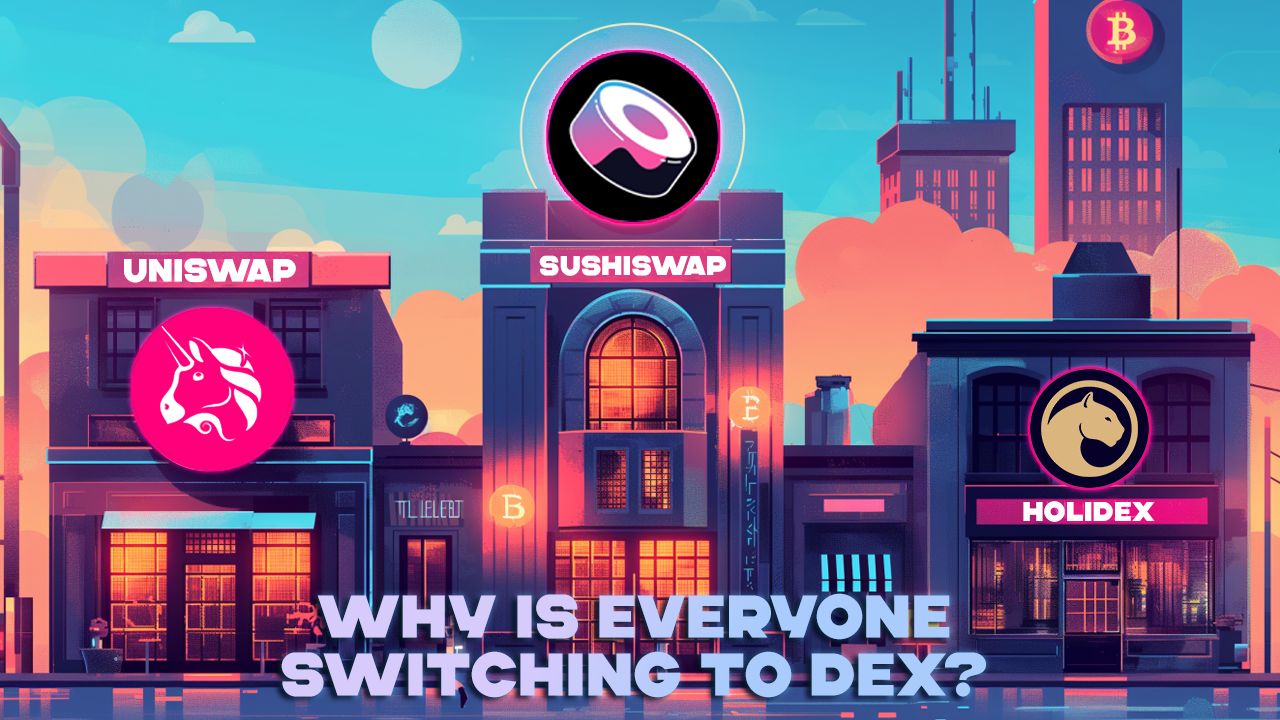Decentralized Exchanges as a Response to KYC Policies
Decentralized exchanges (DEXs) have emerged as a solution to the challenges posed by the “know your customer” (KYC) regulations, which often require traders to disclose their identities. As these regulations began to disrupt the trading experience for many, alternatives surfaced for users who prefer to keep their identities private. Nonetheless, this shift comes with its own set of challenges. This article will explore the benefits and drawbacks of decentralized exchanges, highlighting examples such as QuickSwap and SushiSwap, as well as newer entrants like HoliDEX from Lado Okhotnikov’s Holiverse.
The Evolution of Cryptocurrency Trading
Initially, the cryptocurrency trading landscape was largely dominated by centralized exchanges (CEXs), which facilitated the buying and selling of tokens. However, the introduction of smart contracts marked the beginning of the decentralized exchange era. A pivotal moment in this transition was the launch of the Uniswap protocol, which enabled users to trade ERC-20 cryptocurrencies directly, without relying on intermediaries. This was followed by Balancer, which enhanced DEX capabilities by introducing flexible liquidity pools and innovative trading models. Subsequently, SushiSwap emerged, utilizing an Automated Market Maker (AMM) system that replaced traditional order books with liquidity pools, allowing for automated price calculations based on current trading volumes.
The Advantages and Disadvantages of DEXs
One of the primary benefits of decentralized exchanges is the enhanced security they offer for cryptocurrency users. In a DEX, funds remain in users’ personal wallets, significantly lowering the risk of theft or hacking. Additional advantages include the preservation of privacy, as KYC procedures are not required; a wider selection of tokens and cryptocurrencies, including those not available on conventional exchanges; and generally lower transaction fees compared to centralized platforms. However, a notable drawback is that most DEXs do not allow users to purchase cryptocurrencies using fiat currency, complicating entry for newcomers who must first acquire tokens through a centralized exchange. Other disadvantages include the potential loss of assets due to incorrect token addresses and slower transaction speeds, especially during periods of network congestion, which can hinder the execution of time-sensitive trades.
Popular Networks for Decentralized Exchanges
Various networks serve as the foundation for decentralized exchanges, including Binance Smart Chain (BSC), known for its low fees; Solana, which boasts high transaction speeds; and Avalanche, recognized for its scalability. However, Polygon (formerly Matic Network) stands out among these networks due to its balanced offering of speed, cost-effectiveness, and support for diverse projects. Polygon has become a favored platform for developing decentralized applications (dApps), including prominent metaverses like The Sandbox and Decentraland. This has led to the creation of numerous DEX platforms on Polygon, designed to provide users with efficient and rapid cryptocurrency exchange options.
An Overview of Notable Decentralized Exchanges
QuickSwap is one of the largest DEXs operating on the Polygon network, featuring a broad array of trading pairs and token support. Its advantages include rapid transaction speeds, averaging just 10 to 15 seconds, and lower fees of 0.25%, compared to 0.3% on Ethereum-based DEXs. It also supports a wide variety of assets, including popular cryptocurrencies and stablecoins. However, a significant downside is the absence of customer support.
HoliDEX, a recently launched decentralized exchange on the Polygon network, quickly gained traction, achieving a trading volume of over 1.1 million on its opening day and securing a spot among the top 10 DEXs on the network. The exchange employs Automated Market Making (AMM) and plans to introduce a trading pair with the Holichain (HC) token, which is integral to the Holiverse ecosystem. Despite its recent launch, HoliDEX shows promising liquidity rates, drawing in new users. Its advantages include providing users with the opportunity to learn about managing cryptocurrencies and DeFi tools, as well as rewards for participation in specific programs. However, as a new platform, it requires time to establish its full operational capabilities.
SushiSwap is another well-known DEX operating on the Ethereum blockchain, offering a comprehensive platform for trading various ERC-20 tokens. Its strengths include a high level of liquidity driven by a large user base and opportunities for users to earn by contributing to liquidity pools, along with governance rights through ownership of the $SUSHI token. SushiSwap also collaborates with projects in the DeFi space, expanding user opportunities. However, it faces challenges such as high transaction fees (starting from 0.3%) and a complex interface that may be daunting for new users.
DODO, based on the Proactive Market Maker (PMM) algorithm, distinguishes itself from traditional AMMs by focusing on improving liquidity and pricing accuracy. Operating on Ethereum and Binance Smart Chain, DODO’s advantages include efficient liquidity management, minimized impermanent loss for liquidity providers, and lower fees compared to conventional DEXs. Additionally, DODO provides a variety of earning opportunities beyond basic trading. Nonetheless, the complexity of the PMM algorithm can pose challenges for newcomers who may find it difficult to grasp how prices are set.
Future of Decentralized Exchanges
Looking ahead to 2025, decentralized exchanges are poised to become increasingly popular, especially as regulatory scrutiny on centralized exchanges intensifies. The transparency and autonomy offered by DEXs are likely to attract more users, including significant market players, indicating that decentralized exchanges will solidify their presence and capture a substantial share of the DeFi market.

